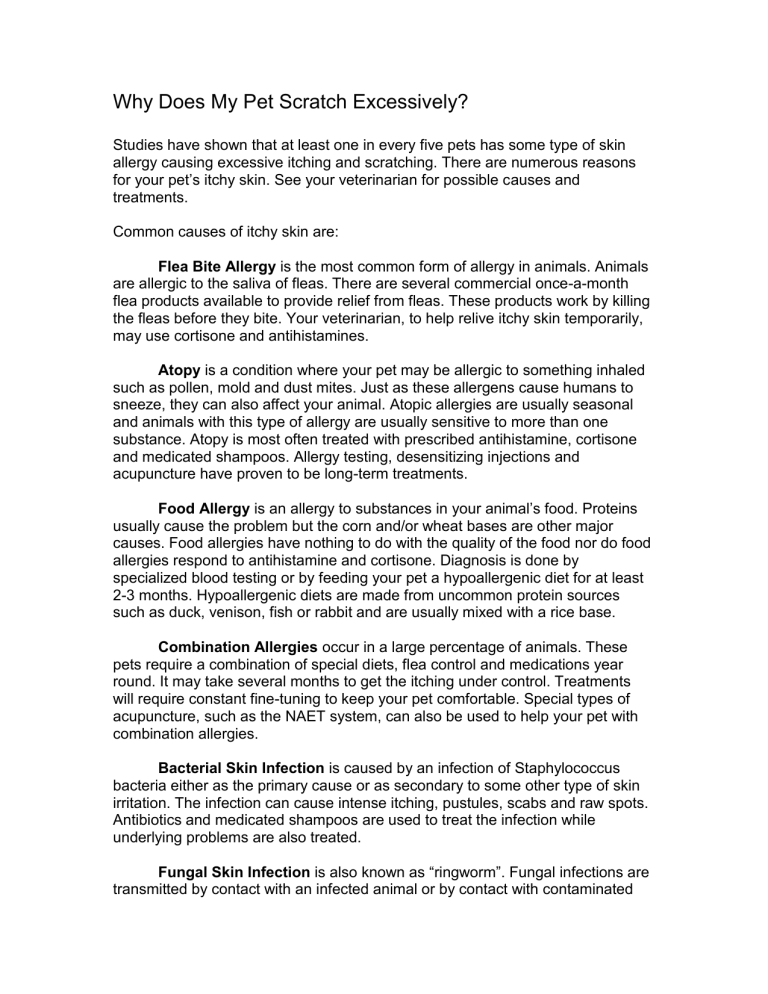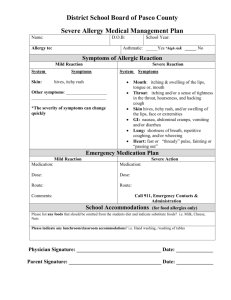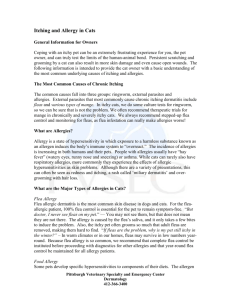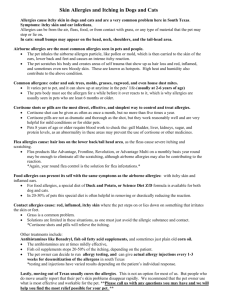Coping with the Death of a Beloved Pet

Why Does My Pet Scratch Excessively?
Studies have shown that at least one in every five pets has some type of skin allergy causing excessive itching and scratching. There are numerous reasons for your pet’s itchy skin. See your veterinarian for possible causes and treatments.
Common causes of itchy skin are:
Flea Bite Allergy is the most common form of allergy in animals. Animals are allergic to the saliva of fleas. There are several commercial once-a-month flea products available to provide relief from fleas. These products work by killing the fleas before they bite. Your veterinarian, to help relive itchy skin temporarily, may use cortisone and antihistamines.
Atopy is a condition where your pet may be allergic to something inhaled such as pollen, mold and dust mites. Just as these allergens cause humans to sneeze, they can also affect your animal. Atopic allergies are usually seasonal and animals with this type of allergy are usually sensitive to more than one substance. Atopy is most often treated with prescribed antihistamine, cortisone and medicated shampoos. Allergy testing, desensitizing injections and acupuncture have proven to be long-term treatments.
Food Allergy is an allergy to substances in your animal’s food. Proteins usually cause the problem but the corn and/or wheat bases are other major causes. Food allergies have nothing to do with the quality of the food nor do food allergies respond to antihistamine and cortisone. Diagnosis is done by specialized blood testing or by feeding your pet a hypoallergenic diet for at least
2-3 months. Hypoallergenic diets are made from uncommon protein sources such as duck, venison, fish or rabbit and are usually mixed with a rice base.
Combination Allergies occur in a large percentage of animals. These pets require a combination of special diets, flea control and medications year round. It may take several months to get the itching under control. Treatments will require constant fine-tuning to keep your pet comfortable. Special types of acupuncture, such as the NAET system, can also be used to help your pet with combination allergies.
Bacterial Skin Infection is caused by an infection of Staphylococcus bacteria either as the primary cause or as secondary to some other type of skin irritation. The infection can cause intense itching, pustules, scabs and raw spots.
Antibiotics and medicated shampoos are used to treat the infection while underlying problems are also treated.
Fungal Skin Infection is also known as “ringworm”. Fungal infections are transmitted by contact with an infected animal or by contact with contaminated
soil. Fungal infections are contagious to other animals and humans. The area will appear as a crusty, circular, hairless, itchy spot although some cats will not show any symptoms but carry the infection. Diagnosis requires a fungal culture followed by oral drugs, topical medications and special shampoos.
Mites (mange) cause several types of itchy infections on your pet. Some mites cause itching themselves and some cause itching after bacteria secondarily infect the skin. A microscopic exam is required to diagnose a mite infection. Depending upon the type of mite, treatment will vary. Some mites, such as the Sarcoptic mange mite, can be transmitted to other animals and humans in the household.
Dry Skin is also another common cause of your pet’s itchy skin. Bathing too often, using the wrong type of shampoo, excessively hot water, blow drying or spending too much time in a swimming pool can cause dry skin. Pets on low fat diets may have dry skin due to the lack of essential fatty acids. Dry skin is diagnosed by observing “dandruff” on your pet’s hair. Moisturizing shampoos and rinses and/or oral fatty acid supplements are used to treat dry skin.
Most animals with itchy skin will suffer from combinations of the common conditions above. There are also other less common causes your veterinarian can diagnose and treat. Combination allergies will require combination treatments. Some allergies may require life long treatment while others will be short term. Following through on any treatment plan is important to your pet’s relief from the torment of itchy skin.
Why should your worry about itchy skin? Your pet will constantly irritate the area, making the itching worse. They will develop raw, open, bleeding sores, which open your pet up to even more bacterial infections. Left untreated, your pet will live a miserable life suffering in agony.







